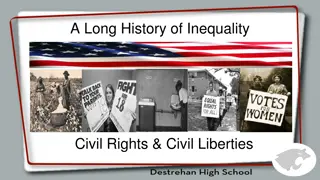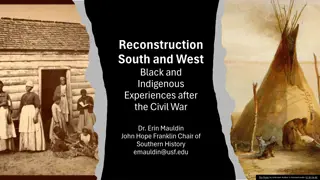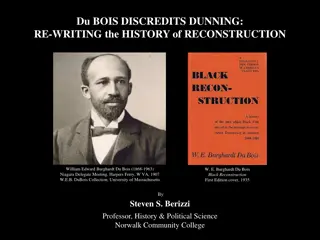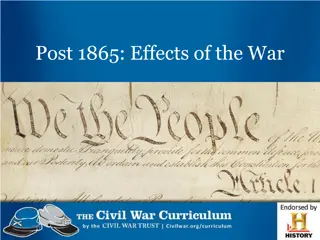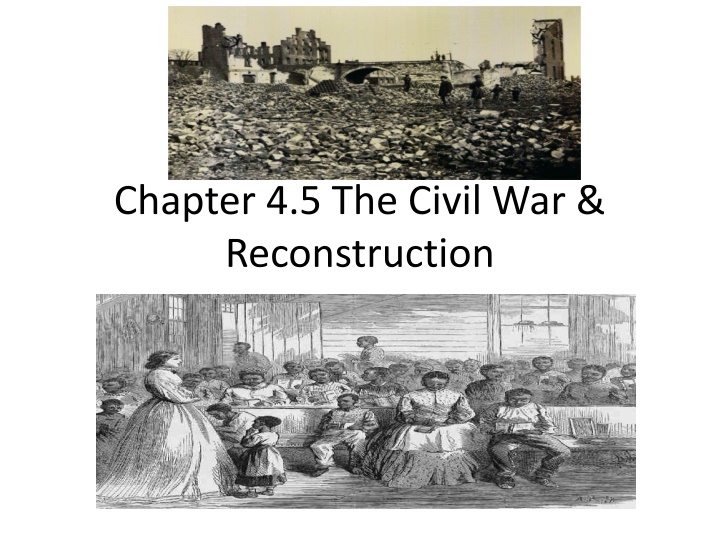
Civil War and Reconstruction: The End of Slavery and the New Amendments
Explore the Civil War and Reconstruction era, from the division of the Union to the Emancipation Proclamation and the aftermath of the war. Learn about the key events, such as the Grand Review of Union Troops, the formation of new governments, and the passage of the 13th, 14th, and 15th Amendments. Dive into the social impact of the war, the struggle for civil rights, and the challenges faced by freed slaves. Discover how the Radical Republicans played a crucial role in shaping the post-war landscape and promoting equality.
Download Presentation

Please find below an Image/Link to download the presentation.
The content on the website is provided AS IS for your information and personal use only. It may not be sold, licensed, or shared on other websites without obtaining consent from the author. If you encounter any issues during the download, it is possible that the publisher has removed the file from their server.
You are allowed to download the files provided on this website for personal or commercial use, subject to the condition that they are used lawfully. All files are the property of their respective owners.
The content on the website is provided AS IS for your information and personal use only. It may not be sold, licensed, or shared on other websites without obtaining consent from the author.
E N D
Presentation Transcript
http://usarmy.vo.llnwd.net/e2/c/images/2011/06/14/200774/size0.jpghttp://usarmy.vo.llnwd.net/e2/c/images/2011/06/14/200774/size0.jpg Chapter 4.5 The Civil War & Reconstruction http://histclo.com/imagef/date/2008/01/harp66-ed01s.jpg
The Civil War & Taking Sides The slave states of Delaware, Maryland, Kentucky, & Missouri remained in the Union however there was a bitter struggle Robert E. Lee was offered command of the Union forces but he instead joined the Confederates b/c he was loyal to Virginia
Emancipation Lincoln initially rejected a policy of emancipation to keep the border states in the Union The Emancipation Proclamation was justified as a military necessity
The End of the Civil War Lincoln s second inaugural address was a plea for reconciliation In April 1865 Gen. Lee surrendered to Gen. Grant at Appomattox Court House The Death toll of the Civil War was 630,000
Questions After the War Should the Confederate leaders be tried for treason? How should new governments be formed? Who should pay for the rebuilding of the of the South s economy? What was to done with the freed slaves? The Grand Review of Union Troops in Victory
New Amendments http://www.mopress.com/_lib/files/13thAmend_pdf__resized_178_231.jpg 13th Amendment an end to slavery (1865) 14th Amendment protect the legal rights of all citizens, due process of law, & citizenship for freedmen (1868) 15th Amendment A/A men could vote (1870)
Legally Free, Socially Bound After the war, rumors swept the South that ex-slaves would receive 40 acres and a mule According to a Confederate general, recently freed blacks had "nothing but freedom"
The Radical Republicans These Republicans understood that essential to maintaining Republican control of the federal government was the right of ex-slaves to vote 14th Amendment guaranteed equal legal protection to all citizens The Civil Rights Act of 1866 was passed over Johnson s veto
Hiram Rhodes Revels He was elected as the first African American to serve in the United States Senate, and was the first African American to serve in the U.S. Congress. He represented Mississippi in the Senate in 1870 and 1871 during the Reconstruction era. During the American Civil War, Revels had helped organize two regiments of the United States Colored Troops and served as a chaplain. After serving in the Senate, Revels was appointed as the first president of Alcorn Agricultural and Mechanical College (now Alcorn State University), 1871-1873 and 1876 to 1882. Later he served again as a minister. http://cdn2-b.examiner.com/sites/default/files/styles/image_content_width/hash/2a/80/2a80a034d387e69debdde9f8c63e8271.jpg?itok=YaA-SUPB
White Terror The primary objective of the KKK was oppressing blacks & white Republicans In response to the Klan, Grant tried to protect black rights White supremacist violence, electoral fraud, the panic of 1873, & the growing weakness of Grant s administration, all contributed to the weakening of Republican control in the South. Cartoon chiding the Ku Klux Klan and the White League for promoting conditions "worse than slavery"
The Election of 1876 Grant didn t seek a 3rd term b/c by 1875, he knew there was growing opposition to his re-nomination The Electoral Commission, set up by congress in Jan. 1877 consisted of 15 members, 5 from the House, Senate, & Supreme Court The Compromise of 1877 ended Radical Reconstruction Tilden Hayes
Booker T. Washington https://upload.wikimedia.org/wikipedia/commons/8/89/Booker_T_Washington_by_Frances_B_Johnston,_c1895-crop.jpg The Atlanta compromise was an agreement struck in 1895 between Booker T. Washington, president of the Tuskegee Institute, and other African- American leaders, and Southern white leaders. It was opposed by W. E. B. Du Bois and other African-American leaders.
W.E.B. Du Bois http://atlantablackstar.com/wp-content/uploads/2014/08/WD1.jpg Du Bois was very much against the Atlanta Compromise. He wanted full civil rights immediately. He went on to co-found the NAACP in 1909
Plessy v. Ferguson https://www.awesomestories.com/images/user/ea716791ee75c7800e85a69b37dcc067.jpg In Plessy v. Ferguson (1896) the Supreme Court ruled segregation was legal if there was equality, however there was rarely ever equality. Brown v. Board of Education (1954) started to change Plessy. http://lawprofessors.typepad.com/.a/6a00d8341bfae553ef014e8731fbf8970d-500wi

![❤[PDF]⚡ Civil War Talks: Further Reminiscences of George S. Bernard and His Fel](/thumb/20551/pdf-civil-war-talks-further-reminiscences-of-george-s-bernard-and-his-fel.jpg)

